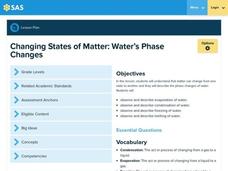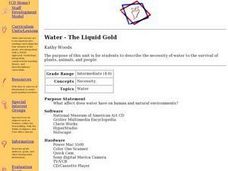Alabama Learning Exchange
The Water Cycle
Learners identify the stages of the water cycle. They listen to the book "Magic School Bus: Wet All Over," examine the Build Your Own Water Cycle website, predict and measure the amount of water in a jar for a week, and read a short play...
Curated OER
The Magic School Bus Dries Up
Students learn along with Ms. Frizzle's class. In this Magic School Bus lesson plan, students work in small groups to find out if foods they eat contain water.
Curated OER
I Just Drank George Washington's Water!
Guide your learners through the water cycle with this lesson plan. Over the course of the lesson plan, they read two Magic School Bus books, discuss the water cycle, come up with water facts, complete a diagram of the water cycle,...
Curated OER
The Magic School Bus Wet All Over
Students observe the water cycle and experiment with cleaning water. In this hands-on hydrology lesson based on a Magic School Bus book, students conduct two experiments to see the how water moves through the water cycle and then they...
Curated OER
Water - Our Future
How is it that water that falls as rain ends up coming out of the tap on our sinks? Learners trace water's journey and examine how along the way pollutants make their way into the water supply. They conduct experiments, use the Internet...
Curated OER
Water Cycle
First graders research for information on the water cycle. They use a hot list to find pictures of the water cycle, and create a movie in Kid Pix about the water cycle.
They present Kid Pix movie to the class.
Curated OER
The Magic School Bus Wet All Over Clean-up!
Students investigate the water cycle using activities from The Magic School Bus series. They determine what happens when water is heated and cooled by observing two different experimental set-ups.
Curated OER
Where Does Water Come From: The Water Cycle
Students explore the water cycle. In this water cycle lesson, students read the book The Magic School Bus Wet All Over and summarize the steps of the water cycle. Students label a picture map of the water cycle.
Curated OER
The Water Cycle
Fourth graders explore changes in water forms. In this water cycle lesson, 4th graders build a water cycle model and monitor it for 2 weeks in order to understand that water changes state as it moves through the cycle.
Curated OER
The Magic School Bus Goes to Seed
Learners learn along with Ms. Frizzle's class. In this Magic School Bus lesson plan, students get a bugs-eye view of the flower world and find out how seeds are created, how they travel, and how they grow into plants.
Pennsylvania Department of Education
Changing States of Matter: Water’s Phase Changes
Third graders observe the properties of water and in its different states. In this states of matter lesson plan, 3rd graders view a video, read The Magic School Bus at the Waterworks and experiment with freezing, melting and...
PBS
Reading Adventure Pack: Oceans
Flotsam by David Wiesner and The Magic School Bus on the Ocean Floor by Joanna Cole, illustrated by Bruce Degen, begin a reading adventure pack focusing on oceans. With story listening and thoughtful discussion, scholars complete several...
Curated OER
Evaporation in the Water Cycle
Students study the stages of the water cycle and evaporation. In this water cycle lesson, students read Water Cycles and color a diagram of the water cycle. Students review related terms and sing a song about the Water Cycle. Students...
Alabama Learning Exchange
Why Does It Rain?
Students investigate the water cycle. They observe a demonstration of the water cycle involving ice, water, bowls, and steam, explore various websites, and listen to the book, "The Magic School Bus: Wet All Over: A Book About the Water...
Curated OER
Water Supply
Fourth graders explore weather patterns by completing an Internet project. In this water cycle lesson, 4th graders read assigned text including a Magic School Bus book about precipitation and water. Students complete a water science...
Curated OER
If I Were A Raindrop!
Students review the water cycle. In this water cycle lesson, students review the different stages of the water cycle. Students use the computer program Kid Pix Weather to help demonstrate understanding.
Curated OER
Water-The Liquid Gold
Students investigate the necessity of water for the survival of plants, animals, and people. They explore the affect that water has on human and natural environments through literature, field trips, and discussions.
Curated OER
Water World Story
Fourth graders write a story about how a drop of water may have traveled to school. They design a presentation on the water cycle.
Curated OER
The Wonderful world of Water
First graders examine the water cycle through readings and experiments. In groups, they conduct interviews with others and use the information to create a chart displaying the various uses of water. After brainstorming lists of ways to...
Curated OER
Flower Power
An engaging, multi-session art and science instructional activity awaits your class. Within this instructional activity, you'll find everything you need to implement the plan. They go on a nature walk around their school, and must...
Curated OER
From Eggs to Frogs
Third graders receive a small container of tapioca pudding, they are to pretend that it is frog eggs. The students pretend they are birds who see the eggs, and eat some of them. They discuss what would happen if these were really frog...
Curated OER
The Path of Water
This project is designed so students can learn about the sources of water, the path it takes to get to homes and businesses, and the ways we use water. Students will begin by expanding their awareness of the hydrosphere as they research...
Curated OER
The Path of Water
Third graders discuss the sources of water, the path it takes to get to homes and businesses, and the ways we use water. Students begin by expanding their awareness of the hydrosphere as they research the water cycle, the sources of our...
Curated OER
Water, Water Everywhere
Students observe and describe ways water is used in their homes and communities. They determine the source of their water. Students determine ways they can save and protect their water.






















